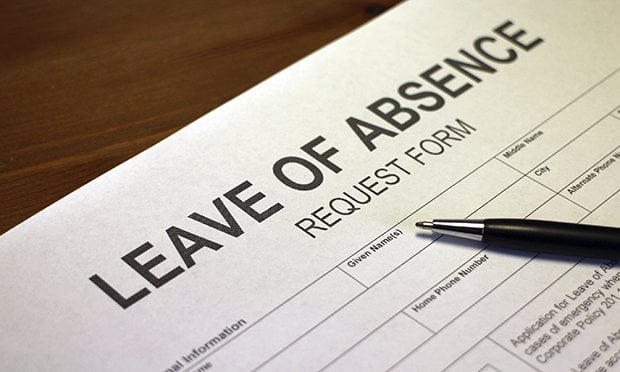 More employers are achieving better outcomes by implementing best practices in leave management, including adopting a centralized model for STD and FMLA intake and increasing health management referrals. (Image: iStock)
More employers are achieving better outcomes by implementing best practices in leave management, including adopting a centralized model for STD and FMLA intake and increasing health management referrals. (Image: iStock)
Employers tend to have better outcomes within their leave management programs if they offer a broad menu of offerings on a centralized platform, and keep the focus on the employee experience, according to the Guardian's Absence Management Activity Index and Study, “The Value of Leave Management Integration.”
“Managing leave is becoming a higher priority for more companies; consequently, they are making a greater effort to reduce absenteeism by managing leave more effectively,” the authors write.
Indeed, four in 10 employers say they are making a major effort to reduce absenteeism, an 86 percent increase in the past four years, according to the latest Guardian survey.
Related: 3 trends making leave management more complex
The average score on Guardian's Absence Management Index jumped significantly to 5.0 in 2018, up 14 percent from 4.4 in 2016, and a 35 percent increase from 3.7 in both 2014 and 2012.
A greater proportion of employers achieved either “Advanced” or “Leader” status in 2018 based on their Index scores (47 percent in 2018 compared to 38 percent in 2016). In addition, fewer employers are categorized as “Laggards” in their absence management activity — just 27 percent vs. 37 percent in 2016.
Why the jump in increased employer activity in managing absence? A number of reasons, according to the report: expansion of state and local leave laws causing increased administrative complexity; potential liability associated with mismanaging employee leave; opportunity to improve workforce health and productivity by applying best practices; desire to improve the employee experience with the leave process; and wider availability of outsourcing options.
More employers are achieving better outcomes by implementing best practices in leave management, including adopting a centralized model for STD and FMLA intake, adopting centralized STD and FMLA administration, and increasing health management referrals – all of which have risen sharply since 2014.
“Increased activity on these three practices indicate growing employer interest in improving leave management efficiency and compliance, while taking a more integrated approach to managing employee health and productivity,” the authors write. “No longer can employers afford to manage employee health and productivity in their human resources, benefits and risk management silos. A more holistic approach is critical to achieve desired outcomes.”
Employers that are more advanced in their leave management approach are making employee experience a high priority, according to the report. Index Leaders focus more than others on improving employee communication, particularly regarding return-to-work and stay-at-work policies and procedures.
“Index Leaders generally place greater emphasis on effective employee communication, particularly providing 'just-in-time education and counseling' and 'making employees feel supported by the organization when taking leave,'” the authors write. “Less back-and-forth communication between managers and employees would be indicative of a more effective and caring process.”
Employers that focus on the employee experience see a reduction in absenteeism (76 percent) and also achieve better overall employee experience (83 percent), according to the report.
Read more:
© 2025 ALM Global, LLC, All Rights Reserved. Request academic re-use from www.copyright.com. All other uses, submit a request to [email protected]. For more information visit Asset & Logo Licensing.








